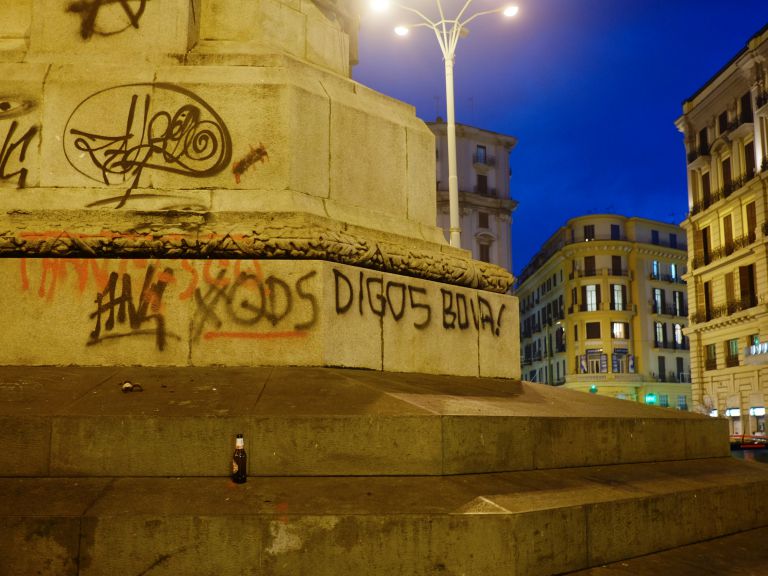Project Detail: Duchesca, Napoli’s Chinatown
Contest:
LuganoPhotoDays 2015 Open
Brand:
LuganoPhotoDays
Author:
Andrea RICCI
Project Info
Duchesca, Napoli’s Chinatown
Duchesca is thought to be the first multi ethnic neighbourhood in Naples.
Historically, a web of alleys once known for its swindlers, the magicians of the “pacco” [literally, the pack ], or the art of selling hifi systems which actually contained bricks rather than electronic components. During the country’s liberation from Nazi Fascism in WWII, the area became one of the centres of Naple’s black market and then progressively the place where goods (such as cameras, then radios and hifi) coming from the NATO base in Bagnoli where introduced - tax free - into the local market.
The key factor in the local economy was cash. Cash made it possible for the local merchants to become pioneers in hard discounting . When the city retailers wanted to avoid filing for bankruptcy, face judges and paperwork, they could convert all their stock into cash at the Duchesca. A stock of kitchen equipment worth - for the retailer - 130 dollars a piece, was bought at 45 and then sold at 80. Duchesca had therefore a reputation of a high risk gambling area, where you could bump into crooks, as well as into the rare merchants who could sell you a fridge for a bargain on August 15th.
Framed by the city’s tribunal, the train station and the Basilica of the Annunziata, Duchesca has evolved in a matter of 10 years into one of Napoli’s most notorious Chinatowns. Chinese entrepreneurs have grown +691,7% in Naples, against a national average of +231,7%. The Chinese of the Duchess come from Guangzhou (Canton), there is even few catholocs. Most employ workers coming from the Arab, Slavic, or South Asian diaspora.
For an impoverished urban middle class their arrival looks like an humiliating occupation. The few remaining Italian businesses are either moribund or have to adapt and serve the new masters.
‘Triunfo, an historic pizzeria of the Duchesca, has closed’, titles the local press, stressing that the Napolitan heir of this quasi institution, sold to Chinese entrepreneurs, leaving Napoli for Korea. Almost a legend.
‘The Cinesa is the take away pizza preferred by the new owners of Duchesca’, explains Gennaro Costa from the pizzeria which corners Via Capuana. ‘Tomato, prosciutto cotto, salami, mushrooms and mais, sometimes french fries too, no mozzarella’. Chinese don't buy pizza at the same price than the rest of Napolitans ‘ Fixed price: four euros, or three and a half’ says Roman, an Ukrainian from Lviv, ‘they eat nothing else’.
For the average Napoletano, Duchess was known for ‘Inno Hit’ radios which stopped working one hour after the purchase, or ‘Piccadilly’ brand boots which broke in two, after a walk of 10 minutes. All this has been replaced by more than a dozen of shops specialised in iPhone accessories, bags, shoes, watches, Blu Rays, ‘Napoli Calcio’ gadgets, and everything Chinese you can by for few euros, including toxic cosmetics and toys which are illegal and dangerous for EU standards.
The commercial intent is to penetrate the zero or sub-zero degree of the market. Selling copies of prestigious brands or ersatz of elegant goods to the impoverished, the poor and the poorest.
The primary target is Italian, the secondary is diasporic.
A diaspora selling to another diaspora is a rather sensitive process. Polite disagreement is not part of the equation. And sometime this leads to violence, like 5 years ago when Duchesca made the news for a Chinese seller who had hit an unhappy Moroccan customer with a hammer on the head.
What has really changed in Duchesca? Duchesca perpetuates the image of a ‘Napoli sporca’, where layers of waste and garbage accumulate, sometimes managing to dig holes in the asphalt. At night, you can still see herds of ‘scugnizzi’ yelling from their scooters: no one wears protections (whereas helmets have finally become an habit, almost everywhere else in the city). Once buying at Duchesca was itself a gamble, now modernity offers live gambling, especially on the city ’s obsession, football. In Duchesca, apartments can go on fire and nobody contemplates erasing the traces of the burns; shops that can afford to have their big signboards upside down because the only board that matters is in Chinese and hung at eye level. Not a lawless part of the city, but one of the many cities within the city, with its own rules. Security forces (the investigative police - the DIGOS) are called ‘executioners’: they should rather mind their own business, instead of chasing poor people trying to make a living with the little they have.
In 2014 a Chinese man aged 36, gets caught in Duchesca selling fake perfumes. Nothing unusual for the spot. Incapable of justifying the origin of the goods, the man tries to purchase the complicity of two Carabinieri with 460€ (in cash, notes the press). He gets arrested and expeditiously sent to Poggioreale, the city’s infamous prison. What’s the part of the story worth hitting the news?
Maybe that a Chinese dared to propose ‘his’ unlawfulness.


















